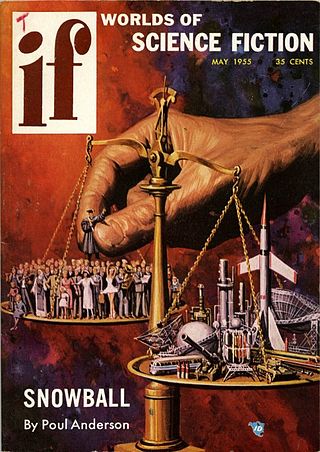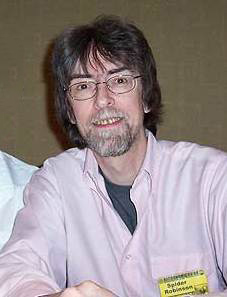Related Research Articles

James White was a Northern Irish author of science fiction novellas, short stories and novels. He was born in Belfast and returned there after spending some early years in Canada. After a few years working in the clothing industry, he worked at Short Brothers Ltd., an aircraft company based in Belfast, from 1965 until taking early retirement in 1984 as a result of diabetes. White married Margaret Sarah Martin, another science fiction fan, in 1955 and the couple had three children. He died of a stroke.

Robert Shaw was a science fiction writer and fan from Northern Ireland, noted for his originality and wit. He won the Hugo Award for Best Fan Writer in 1979 and 1980. His short story "Light of Other Days" was a Hugo Award nominee in 1967, as was his novel The Ragged Astronauts in 1987.

If was an American science fiction magazine launched in March 1952 by Quinn Publications, owned by James L. Quinn.

Spider Robinson is an American-born Canadian science fiction author. He has won a number of awards for his hard science fiction and humorous stories, including the Hugo Award 1977 and 1983, and another Hugo with his co-author and wife Jeanne Robinson in 1978.

Asimov's Science Fiction is an American science fiction magazine which publishes science fiction and fantasy named after science fiction author Isaac Asimov. It is currently published by Penny Publications. From January 2017, the publication frequency is bimonthly.

David Rowland Langford is a British author, editor, and critic, largely active within the science fiction field. He publishes the science fiction fanzine and newsletter Ansible, and holds the all-time record for most Hugo Awards, with a total of 29 wins.

Gordon Randall Phillip David Garrett was an American science fiction and fantasy author. He was a contributor to Astounding and other science fiction magazines of the 1950s and 1960s. He instructed Robert Silverberg in the techniques of selling large quantities of action-adventure science fiction, and collaborated with him on two novels about men from Earth disrupting a peaceful agrarian civilization on an alien planet.

Interzone is a British fantasy and science fiction magazine. Published since 1982, Interzone is the eighth-longest-running English language science fiction magazine in history, and the longest-running British science fiction (SF) magazine. Stories published in Interzone have been finalists for the Hugo Awards and have won a Nebula Award and numerous British Science Fiction Awards.
Michael Lawson Bishop is an American writer. Over four decades and in more than thirty books, he has created what has been called a "body of work that stands among the most admired and influential in modern science fiction and fantasy literature."

Patricia Anne McKillip was an American author of fantasy and science fiction. She has been called "one of the most accomplished prose stylists in the fantasy genre", and wrote predominantly standalone fantasy novels. Her work won numerous awards, including the World Fantasy Award for Lifetime Achievement in 2008.
Charles Leonard Harness was an American science fiction writer.
"If All Men Were Brothers, Would You Let One Marry Your Sister?" is a science fiction short story by American writer Theodore Sturgeon. It first appeared in Harlan Ellison's anthology Dangerous Visions in 1967.
Hilbert van Nydeck Schenck, Jr. was an American science fiction writer and engineer. He taught at the University of Rhode Island.

Gilgamesh in the Outback is a science fiction novella by American writer Robert Silverberg, a sequel to his historical novel Gilgamesh the King as well as a story in the shared universe series Heroes in Hell. It won the Hugo Award for Best Novella in 1987 and was also nominated for the Nebula Award for Best Novella in 1986. Originally published in Asimov's Science Fiction, it was then printed in Rebels in Hell before being incorporated into Silverberg's novel To the Land of the Living. Real-life writers Robert E. Howard and H. P. Lovecraft feature as characters in the novella.

The Year's Best Science Fiction: Sixth Annual Collection is a science fiction anthology edited by Gardner Dozois that was published in 1989. It is the 6th in The Year's Best Science Fiction series and winner of the Locus Award for best anthology.

The Nebula Awards annually recognize the best works of science fiction or fantasy published in the United States. The awards are organized and awarded by the Science Fiction and Fantasy Writers of America (SFWA), a nonprofit association of professional science fiction and fantasy writers. They were first given in 1966 at a ceremony created for the awards, and are given in four categories for different lengths of literary works. A fifth category for film and television episode scripts was given 1974–78 and 2000–09, and a sixth category for game writing was begun in 2018. In 2019 SFWA announced that two awards that were previously run under the same rules but not considered Nebula awards—the Andre Norton Award for Middle Grade and Young Adult Fiction and the Ray Bradbury Award for Outstanding Dramatic Presentation—were to be considered official Nebula awards. The rules governing the Nebula Awards have changed several times during the awards' history, most recently in 2010. The SFWA Nebula Conference, at which the awards are announced and presented, is held each spring in the United States. Locations vary from year to year.
"Unicorn Variation" is a 1981 fantasy story by American writer Roger Zelazny. It was first published in Isaac Asimov's Science Fiction Magazine.
"The Compleat Werewolf" is a 1942 fantasy short story by Anthony Boucher. It was first published in Unknown Worlds.
Brittle Innings is a 1994 science fiction/fantasy novel by American author Michael Bishop.

The Best of Murray Leinster is the title of two collections of science fiction short stories by American author Murray Leinster. The first, a British edition edited by Brian Davis, was first published in paperback by Corgi in December 1976. The second, an American edition edited by J. J. Pierce, was first published in paperback by Del Rey/Ballantine in April 1978 as a volume in its Classic Library of Science Fiction. The American edition has since been translated into German and Italian.
References
- ↑ The Geometry of Narrative, at Science Fiction Writers of America; retrieved October 13, 2018
- ↑ 1984 Hugo Awards, at TheHugoAwards.org; retrieved October 13, 2018
- ↑ Science Fact and Science Fiction: An Encyclopedia, by Brian Stableford; published September 6, 2006, by Routledge